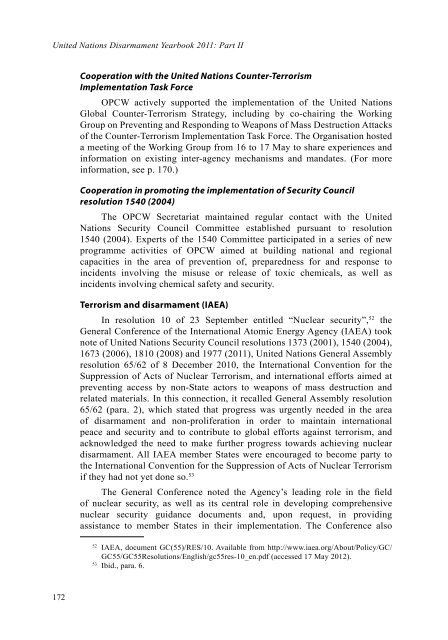DYB2011-Part-II-web
DYB2011-Part-II-web
DYB2011-Part-II-web
Create successful ePaper yourself
Turn your PDF publications into a flip-book with our unique Google optimized e-Paper software.
United Nations Disarmament Yearbook 2011: <strong>Part</strong> <strong>II</strong><br />
172<br />
Cooperation with the United Nations Counter-Terrorism<br />
Implementation Task Force<br />
OPCW actively supported the implementation of the United Nations<br />
Global Counter-Terrorism Strategy, including by co-chairing the Working<br />
Group on Preventing and Responding to Weapons of Mass Destruction Attacks<br />
of the Counter-Terrorism Implementation Task Force. The Organisation hosted<br />
a meeting of the Working Group from 16 to 17 May to share experiences and<br />
information on existing inter-agency mechanisms and mandates. (For more<br />
information, see p. 170.)<br />
Cooperation in promoting the implementation of Security Council<br />
resolution 1540 (2004)<br />
The OPCW Secretariat maintained regular contact with the United<br />
Nations Security Council Committee established pursuant to resolution<br />
1540 (2004). Experts of the 1540 Committee participated in a series of new<br />
programme activities of OPCW aimed at building national and regional<br />
capacities in the area of prevention of, preparedness for and response to<br />
incidents involving the misuse or release of toxic chemicals, as well as<br />
incidents involving chemical safety and security.<br />
Terrorism and disarmament (IAEA)<br />
In resolution 10 of 23 September entitled “Nuclear security”, 52 the<br />
General Conference of the International Atomic Energy Agency (IAEA) took<br />
note of United Nations Security Council resolutions 1373 (2001), 1540 (2004),<br />
1673 (2006), 1810 (2008) and 1977 (2011), United Nations General Assembly<br />
resolution 65/62 of 8 December 2010, the International Convention for the<br />
Suppression of Acts of Nuclear Terrorism, and international efforts aimed at<br />
preventing access by non-State actors to weapons of mass destruction and<br />
related materials. In this connection, it recalled General Assembly resolution<br />
65/62 (para. 2), which stated that progress was urgently needed in the area<br />
of disarmament and non-proliferation in order to maintain international<br />
peace and security and to contribute to global efforts against terrorism, and<br />
acknowledged the need to make further progress towards achieving nuclear<br />
disarmament. All IAEA member States were encouraged to become party to<br />
the International Convention for the Suppression of Acts of Nuclear Terrorism<br />
if they had not yet done so. 53<br />
The General Conference noted the Agency’s leading role in the field<br />
of nuclear security, as well as its central role in developing comprehensive<br />
nuclear security guidance documents and, upon request, in providing<br />
assistance to member States in their implementation. The Conference also<br />
52 IAEA, document GC(55)/RES/10. Available from http://www.iaea.org/About/Policy/GC/<br />
GC55/GC55Resolutions/English/gc55res-10_en.pdf (accessed 17 May 2012).<br />
53 Ibid., para. 6.


